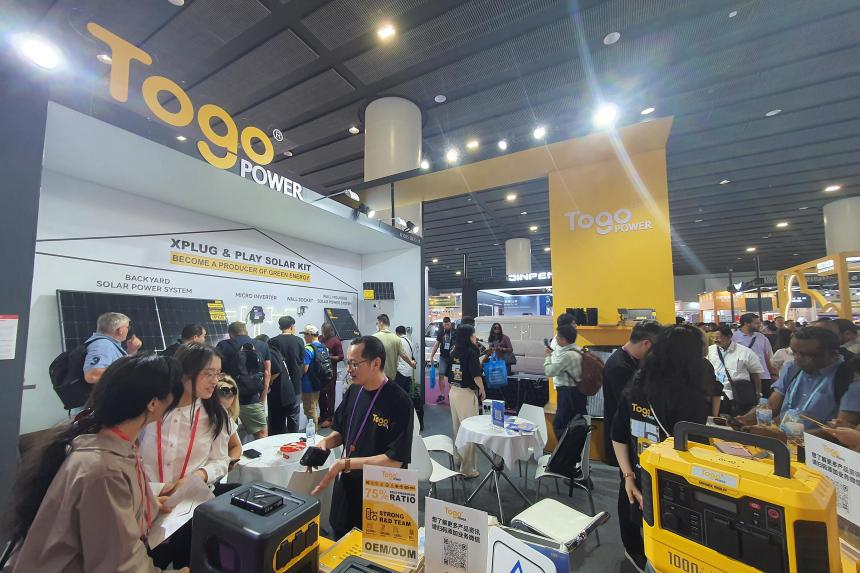GUANGZHOU – China’s green technology companies gathered this week at the country’s biggest trade fair to chase new export deals, even as the industry finds itself in the cross hairs of American and European leaders who complain that an oversupply of cheap Chinese goods is hurting their producers.
Shiny electric vehicles (EVs), sheets of solar panels and lithium-ion batteries of all shapes and sizes were among the wares lining the halls of the Canton Fair in Guangzhou, in a space 12 times the size of the Singapore Expo.
This spring edition of the biannual fair runs from April 15 to May 5, with the green tech firms here for the first five days.
Despite the spectre of fresh tariffs following from the US and European Union’s complaints, company representatives at the fair appeared unfazed, claiming that they expected sales in 2024 to reach a post-pandemic high. They are keeping up efforts to sell to these markets, as well as to buyers around the world, they said.
Europe, especially, is a coveted market for many Chinese sellers given its sizeable demand for clean energy products.
Dayun Group, a Chinese carmaker from Shanxi province, will soon have an EV entering the European market, said a business manager for the company. Currently, its main markets for EVs include Mexico and Myanmar.
While acknowledging that “there might be worries” that the EU might make it difficult for Chinese products to be sold in the European market, he added that “consumers do want to purchase”, with buyers from Europe having surveyed the model on display at the fair.

In 2023, the EU launched an anti-subsidy investigation into Chinese EVs that could lead to the bloc imposing additional tariffs on EV imports from China.
Solar manufacturer ERA Group from Zhejiang province has rolled out a new solar panel targeting the European market, said the company’s deputy sales manager, Mr Xu Leiping.
The EU so far has avoided imposing tariffs on solar imports from China, with its energy policy chief Kadri Simson stating in March that cutting off such imports could compromise the bloc’s ability to meet its climate targets.
Said Mr Xu: “Europe and the US need China’s high-quality and low-cost products to accelerate their energy transitions.”
Fujian’s Skytimes Green Energy, whose products include portable lithium-ion power stations and customised solar chargers, hopes to expand its market in Europe, as well as in countries participating in China’s Belt and Road Initiative (BRI). More than 150 countries are taking part in BRI, a global infrastructure development strategy.
Skytimes sales director Ella Zheng said she expects the green energy products maker to double its sales in 2024, from its 2023 export takings of 100 million yuan (S$19.2 million).
More than 125,000 foreign buyers visited on the first five days of the ongoing fair, up by 23.2 per cent from the same window at the previous fair, according to reports by Chinese state media.
The hope, for the over 28,000 exhibitors at the fair across a range of industries, is that the footfall will translate into sizeable orders. This is as China’s domestic demand remains tepid and its exports face a fragile recovery, with shipments in March contracting 7.5 per cent from a year before.
The last edition of the fair held in the autumn of 2023 saw a weaker showing than just before the Covid-19 pandemic, with US$22.3 billion (S$30.4 billion) in export deals inked – down from US$29.3 billion in the autumn of 2019.
In a push for more foreign trade and to cultivate links, Chinese Premier Li Qiang visited the fair and engaged with Chinese sellers and foreign buyers on April 17 and 18. The last time a premier showed up at the Canton Fair was in 2021.
Mr Li’s visit took place shortly after he received German Chancellor Olaf Scholz in Beijing, the latest foreign leader after US Treasury Secretary Janet Yellen to raise concerns about Chinese industrial overcapacity.
Dr Dan Wang, chief economist at Hang Seng Bank in Shanghai, said that tariffs from the US and EU on China’s green products are anticipated to go up, and Chinese firms have had to find alternative pathways to sell to these markets.
Some have relocated production to third countries, she noted. These include South-east Asian countries such as Cambodia, Malaysia, Thailand and Vietnam.
More significantly, Chinese firms have also been investing directly in the countries they wish to sell to, Dr Wang added.
For example, Chinese solar giants such as Longi Green Energy Technology and Trina Solar have announced factories in the US.
The US already levies tariffs on solar products from China, and is slated to impose similar taxes from June on Chinese companies found to have been evading American tariffs by finishing their products in South-east Asia.
Mr Michael Wen, deputy sales director at Guangdong Jinyuan Solar Energy, said Chinese companies have sold solar products to the US, including through countries like Vietnam. “Many solar panels in the US are basically Chinese products,” said Mr Wen.

Dr Wang does not expect that trade restrictions stemming from the US and EU’s overcapacity complaints will have a major impact on China’s overall exports.
“The main effect is a shift in composition – more of China’s exports will be intermediate industrial inputs rather than final products,” she said, referring to how Chinese companies would send these components to the countries where their factories are located.
Meanwhile, shoppers at the Canton Fair are not complaining about a proliferation of affordable Chinese green technology.
Australian importer John Walco had already purchased three containers of items such as solar and battery products with an associate after one morning at the fair.
“We like the overcapacity problem because it brings the price down,” he quipped.

